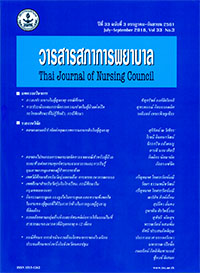Caregiving Activities, Motivations for Caregiving, and Job Satisfaction of Paid Caregivers for Bed Bound Older Adults
Keywords:
bed bound older adults, paid caregivers, caregiving activities, caregiving motivations, job satisfactionAbstract
Objective: To study 1) caregiving activities; 2) caregiving motivations; and 3) job
satisfaction of paid caregivers for bed bound older adults.
Design: Descriptive research.
Procedure: The participants were 36 paid caregivers to take care of bed bound older
adults at their homes for 1 month or more. Data were collected using three questionnaires (namely,
a questionnaire on demographic data; a questionnaire on their caregiving activities for bed
bound older adults; and a questionnaire on their satisfaction with the job of caring for bed bound
older adults) and an interview on their motivations to become caregivers for bed bound
older adults. The data were analysed using descriptive statistics and content analysis.
Results: More than two-thirds of the participants (69.4%) had not passed an older
adult caregiving training programme. Their major caregiving activities included an average
of 8.17 daily routine activities and 6.50 specialised care activities, in addition to mental,
emotional, and social activities. The participants’ caregiving motivations included their 1) need
for income; 2) love of caregiving; 3) bond with older adults; and 4) desire for knowledge and
experience, respectively.
The participants displayed a high overall degree of satisfaction with their job. The three
aspects offering the highest satisfaction were occupational pride, opportunity to live with elderly
people, and the opportunity to take care of older adults, respectively. In contrast, the three aspects
offering lowest satisfaction concerned their permitted holidays, welfare received, and income,
respectively.
Recommendations: According to the fndings, healthcare teams should provide paid
caregivers with proper training to improve their skills in caring for bed bound older adults and
responding to their complicated needs. Meanwhile, promotion of factors contributing to caregivers’
job satisfaction is also recommended.
Downloads
References
2013. (in Thai)
2. Leelapattana W, Hathirat S. Working with caregiver burnout. [online] 2016. [cited 2016 June 15]. Avaliable from: https://www.dmthai.org/news_and_knowledge/1192 (in Thai)
3. Bureau of Health Promotion. Annual Report, Department of Health 2013. Nonthaburi: Planning Division of Department of Health; 2013. (in Thai)
4. Prasartkul P. Situation of the Thai elderly 2014. Bangkok: Amarin Printing & Publishing; 2014. (in Thai)
5. Artsanthia J, Kampraw P. Modality of care for the older adults in community. Journal of The Royal Thai Army Nurses 2014;5(13):123-27. (in Thai)
6. Yodpet S, Sombat L, Choktanawanich P, Sakdaporn T. Good models on the elderly care by family and
community in rural areas in Thailand. Bangkok: Health Sciences Research Institute; 2009. (in Thai)
7. Ngoichansri J, Kongtaln O. Development of continuing care for the home bound and bed bound elders in Phetchabun municipal community. [Master thesis]. KhonKaen: KhonKaen University; 2012. (in Thai)
8. Manorath P. Elderly: impact and social role of care. Boromarajonani College of Nursing, Uttaradit Journal
2013;5(2):98-103. (in Thai)
9. Sihapark S, Chuengsatiansup K, Tengrang K. The effects and caregiving burdens of older persons in long term care based on Thai culture. Bangkok: Health Systems Research Institute; 2014. (in Thai)
10. Sasat S. Elderly care assistant: formal caregiver and how to carry out quality assurance in Thailand. V.print
(1991) Co.,LTD; 2012. (in Thai)
11. Papangkorn R. Caregivers’ experience in caring for dependent elderly persons. [Master thesis]. Nakhon Pathom: Mahidol University; 2003.
12. Sasat S. (2010). Trends and direct of long-term for older people. Thai Journal of Nursing Council,
25(3), 5-10. (in Thai)
13. Bundhamcharoen K. Synthesis of long-term care system for the elderly in Thailand. Bangkok: TQP
company limited; 2010. (in Thai)
14. Sritanyaratana W, Damrikarnlerd L. Elderly services practices. Bangkok: Sahamitr Printing and Publishing;
2010. (in Thai)
15. Sirapo-ngam Y. Family caregiver: concepts and research issues. Rama Nurs J 1996;2(1):84-94. (in Thai)
16. Akanimanee N. Eldercare workers’ opinion on job satisfaction factors in Bangkok metropolis. [Master
thesis]. Nakhon Pathom: Mahidol University; 2002.
17. Yamane T. Statistics: an introductory analysis, 2nd edition, New York: Harper and Row; 1967.
18. Jitapunkul S, Kamolratanakul P, Chandraprasert S, Bunnag S. Disability among Thai elderly living in Klong Toey Slum. Journal of the Medical Association of Thailand 1994;77(5): 231-38.
19. Won CW. Elderly long-term care in Korea. J Clin Gerontol Geriatr 2013;4:4-6.113
20. Chanpradit A. Need of care and customer satisfaction from eldercare workers in metropolis Bangkok. [Master thesis]. Nakhon Pathom: Mahidol University; 2003.
21. Sirapo-ngam Y. A survey of family caregiving research in Thailand. Rama Nurs J 2003;9(2):156-65.
22. Intarasombat P, Sirapo-ngam Y, Chansirikarn S, Yamvong C, Mahakayanun S. Effects of patients and families participation in health care on functional outcomes, well-being, complications, length of stay in elderly patients, and patients and families satisfaction with care. Rama Nurs J 1996;2(3):4-15. (in Thai)
23. Palaburee S, Takam K. Activity of daily life and caregiving demand of elderly in Nai-Wiang subDistrict munipality, Phrae Province. Journal of the Phrae Hospital 2013; 21(1):42-54. (in Thai)
24. Siritipakorn P, Muangpaisan W. Factors of caregiver burden among family caregivers of dementia patients
in a geriatric clinic, Siriraj Hospital. Journal of Nursing Science & Health 2015;38(2): 54-64. (in Thai)
25. Schulz R, Biegel D, Morycz R, Visintainer P. Alzheimer’s disease treatment and family stress. New York: Hemisphere Publishing Corporation; 1989.








